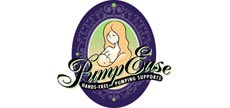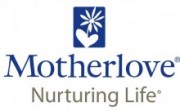By Amy West, CLC. Posted on February 23, 2010
By Amy West, CLC (amy@bestforbabes.org)
*UPDATE: The InfantRisk Center is now open! (806)-352-2519* That’s a number all breastfeeding moms should have, and can also give to care providers when medications are being prescribed.
When we talk about breastfeeding moms and medications, we reference Dr. Thomas Hale’s Medications and Mothers’ Milk. It’s the golden standard for finding information on how drugs affect breastfeeding mothers, their babies, and their breast milk. No other reference compares (for details on why Hale’s is the standard, read this article from Medscape).
The definitive guide to medications & breast milk
While the lactation community recognizes Dr. Hale’s work and uses it frequently, it’s not something that the medical community at large has adopted. Too many doctors, nurses, pharmacists and other practitioners simply aren’t aware that this reference is available-though as membership in the Academy of Breastfeeding Medicine grows, that will hopefully change. In the meantime, the Physician’s Desk Reference is the guide practitioners typically use to advise pregnant and lactating mothers. In short, the default listing for most medications in the PDR is to take the most conservative route possible: recommend that pregnant and lactating mothers not use them, as research is scarce and lawsuits are abundant.
This is where Dr. Thomas Hale has done a great service to the breastfeeding community: he has produced Medications and Mothers’ Milk, an evidence-based guide to lactational pharmacology (it includes information for pregnant women, as well). It is updated biannually in print form and on an ongoing basis online.
Here’ s the problem: If practitioners don’t know about Medications and Mothers’ Milk, or if they do, but don’t use it . . . then mothers and babies suffer. All too often, this is the case. It doesn’t have to be this way!
The solution? To create the InfantRISK Center. The goal of the InfantRISK Center is “To form a national call center, where mothers and their doctors can access up-to-date, evidence-based answers to their questions about using specific medications during pregnancy or lactation” (quote from the InfantRISK Center information page).
The sad reality of the medical world today is that practitioners simply aren’t educated enough on the subject of breastfeeding. And while every practitioner ought to have a copy of Medications and Mothers’ Milk, far too few do. This national call center can fill in the space where training and education fall off, giving practitioners the ability to provide their patients with accurate, safe advice in a timely manner. The InfantRISK Center can also be at the forefront of furthering research on lactation and medications, an area that is sorely lacking.
The key part of the InfantRISK Center’s mission is that it is also for mothers. Not every pregnant or breastfeeding mother is going to own their own copy of Medications and Mothers’ Milk. That said, many moms realize that they aren’t getting the most accurate, breastfeeding-friendly advice possible from their practitioners (for help in choosing great practitioners, see Your A-Team). The InfantRISK Center will give them a hotline to call and check on how drugs might interact with pregnancy and lactation, and do so with confidence and ease. No more consulting with Doctor Google when they aren’t comfortable with the counsel they’ve been given; no more asking around to friends; no more wondering. That’s a beautiful and Babe-worthy thing!
Here’s are some more details on how much this Center could serve the breastfeeding community: (taken from this page)
- [Provide] drug risk information based on evidence
- Reduce misinformation
- Reduce unnecessary pregnancy terminations
- Reduce unnecessary lactation termination (early weaning, leading to increased health risks for mother & baby)
- Provide health care professionals with accurate and understandable risk information and registry data
- Provide and advise physicians on alternative medications
The InfantRISK Center has huge potential for helping moms and babies. The challenge will be getting the word out to doctors, nurses, pharmacists, practitioners and moms so that all of them know where to turn whenever there is a question about breastfeeding and medications. You can help by letting other moms and your health care providers know about it-share this blog post!
If you’d like to help Best for Babes get this information into the hands of more moms and healthcare providers, you can donate here.
By Bettina. Posted on November 2, 2009
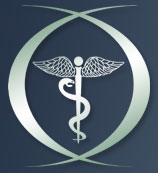
Academy of Breastfeeding Medicine
We are very, very excited and honored to be speaking at the Academy of Breastfeeding Medicine‘s 14th Annual International Meeting, held in Williamsburg, Virginia from November 5-8th, 2009. You can see the complete meeting program here. If you have been hanging around the boob world for a little while, you will notice that many titans of the breastfeeding movement will be there . . . such as Ruth Lawrence, MD, FABM, Breastfeeding Section Chair, American Academy of Pediatrics; Suzanne Haynes; Department of Health and Human Services (we idolize her for her tough comments when the government’s ad campaign buckled under formula lobbyist influence); Lawrence Grummer-Strawn, PhD, Chief of the Nutrition Branch of the Centers for Disease Control; Audrey Naylor, MD, DrPH, FABM, Marshall Klaus, MD, to name just a few! We are in awe of these pioneers and leaders.
The Academy of Breastfeeding Medicine (ABM) was founded by a group of physicians who met at an International Lactation Consultants Association (ILCA) Meeting in 1993.
“Physicians identified several common needs, including sharing resources on physician education and breastfeeding management issues. . . . [The] drive to establish an organization was fueled by the many case reports presented by LC’s in training, which were able to illustrate situations where physicians participated in barriers preventing breastfeeding success. Several LCs were so enthusiastic about the start-up of a physician breastfeeding organization that they donated money on the spot, to ignite its beginning.”
The ABM’s Position Statement (which is worth reading) explains that
“in order to optimize breastfeeding practices universally, physicians must learn evidence-based breastfeeding medicine, skills, and attitudes. There have been relatively few physicians committed to these goals . . . physicians play a central role in the promotion, protection and support of breastfeeding. We stress that breastfeeding and human lactation warrant serious, increased and significant attention in medical training, practice and research, given the substantial and longitudinal impact of breastfeeding on maternal, child and societal health, as well as the influence healthcare policies and practices have on women’s breastfeeding decisions and success in achieving their goals.”
In talking to hundreds of mothers about their breastfeeding experiences, we have heard wonderful stories of physicians who have encouraged their patients without pressure, judgment or guilt, but we have also heard horror stories of physicians who undermined a mother’s feeding decision, or her breastfeeding success, often unknowingly, thereby becoming one of the “booby traps!” Jack Newman, MD has been very outspoken about how to spot a doctor who is not breastfeeding-friendly. Finding an ob-gyn and pediatrician for your baby that is truly supportive of your decision to breastfeed is part of our Ultimate Breastfeeding Preparation Checklist and is discussed in “Your A-Team: Finding a Pre-Natal Care Provider, Hospital, and Pediatrician. ”
Best for Babes believes that the work of the Academy of Breastfeeding Medicine (ABM) is critically important. Do you agree? If so, how can we help the ABM grow and succeed? The ABM has a membership of 525. The American Academy of Pediatrics has a membership of 60,000. Should all pediatricians be required to be educated in the basics of lactation management, even if it is just how encourage and appropriately refer patients? Should ob/gyns be similarly required to attend a basic training? The ABM offers a one-day course “What Every Physician Needs to Know about Breastfeeding” on the first day of the conference. Do you think your child’s pediatrician, or your ob/gyn, or your allergist, or cardiologist, would be willing to take such a course? Would your pediatrician or ob/gyn be willing to become a Fellow of the Academy of Breastfeeding Medicine (FABM), much as many doctors are fellows of the American Academy of Pediatrics (FAAP)? What would be helpful to you in talking to your various physicians about breastfeeding support? What experiences have you had?
We are looking forward to hearing your thoughts!
By Bettina. Posted on October 13, 2009
Last Tuesday (October 6th) I attended the Big City Moms‘ Biggest Baby Shower Ever, held at the American Girl Place in New York City. It was an awesome event and the line to get in went down the block. All three floors were chock full of vendors, delicious treats, and fabulous moms-to-be chatting, checking out the goods, and asking questions about baby car, safety and sleep habits.
Seminars on a variety of topics were held on the first floor every twenty minutes or so. I thought Big City Moms did a great job addressing subjects that moms are interested in; including sleep, feeding, and safety. As fun as it is to shop and prepare the nursury it is so important the new mothers have the information they need to make healthy decisions!
The first seminar that I did not want to miss was Dr. Alan Greene speaking about “Feeding Baby Green: Teaching Your Baby to Love Healthy Foods.” Boy is this guy excited about babies eating!! He talked about how babies’ tastebuds are actually most sensitive in utero, and that they practice swallowing before they are born, drinking up to 3 cups of amniotic fluid per day! Dr. Greene explained that not all nutrients pass through the umbilical cord, and that the baby is actually bonding with and getting to know his mother. I really appreciated his non-judgmental style of speaking that addressed the concerns of mothers who were planning to breastfeed as well as those who were not. He talked about “imprinting” and how babies who are breastfed get thousands of different flavors from mothers’ milk, exposing their tastebuds early on, and suggested that formula feeding moms switch brands a few times to change things up. Dr. Greene doesn’t go for a lot of the standard feeding advice given by many pediatricians, especially as far as allergies and feeding schedules, and he explains why in his book, which was included in the gift bags. I found his lecture to be super interesting and informative and well, really intuitive! As a mom I always wondered why introducing solids had to be this highly controlled experiment, when really, babies have been reaching out of the sling for millenia to grab a bit of what’s going into mama’s mouth.
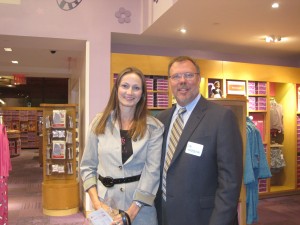
Me and Dr. Alan Greene at the Big City Moms Event
I was fortunate to get a chance to speak with Dr. Greene before his talk . . . I knew about his great work with Healthy Child, Healthy World and was excited to meet him. I told him about what Best for Babes was doing and right off the bat he bubbled over with enthusiasm and fired off some recent breastfeeding research studies. It was clear that he is very pro-breastfeeding and very knowledgeable about lactation science. I told him I thought it was great that the Born Free bottles were BPA-free and hoped that the company would become WHO Code Compliant. Dr. Greene shared that his wife is a breast cancer survivor (like my business partner, Danielle Rigg), and we talked about how strange it was that the big breast cancer organizations didn’t jump with joy over a recent study showing that women with a family history of breast cancer can reduce their risk by 60% — yes, 60% — if they breastfeed their babies. We see eye to eye on a number of things and I was thrilled to meet him.
Kelly Rutherford & Me (Bettina Forbes, Co-Founder, Best for Babes)
The last seminar of the evening was actress Kelly Rutherford speaking about “Socially Conscious Mothering.” She is incredibly down to earth and warm and spent most of the time answering questions from the floor. She has a very nurturing style and made me feel like we’re all in this together, trying to do our best as parents, picking ourselves and each other up when we fall. She talked about some of the personal decisions she had made, including tandem nursing (see our interview with her) and her choice not to vaccinate. I appreciated that she was very open as a mother who is trying to parent in a socially conscious way, and shared her own experience. I think she is an awesome role model and all the expecting moms really enjoyed talking to her. Best for Babes is very lucky to have her as a Champion for Moms!
All in all it was a great evening and a great resource for moms-to-be. Everyone left with a huge gift bag filled with gorgeous items, and better prepared for motherhood!



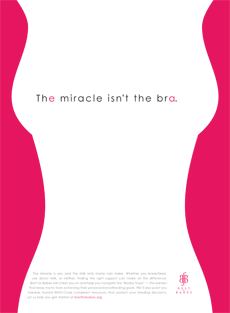
 @BestforBabes
@BestforBabes Best For Babes
Best For Babes


